

A Year of Connection
2025 Annual Report
The theme of this year’s annual report—connections—could not be more fitting. At its core, connection is the act of linking one thing to another, and in our work, it is the spark that turns vision into reality.
John Lennon once said, “A dream you dream alone is only a dream. A dream you dream together is reality.” This quote beautifully captures the essence of what we do at the Community Foundation: we connect dreamers—donors, grantees, and community members—to one another in pursuit of the greater good.
I see this truth reflected every day. The positive connections we make with others enrich our lives, and the connections the Community Foundation has fostered with grant and scholarship recipients have enriched thousands of lives over the past three decades.
Earlier this year, I worked with a client who was adopting a young relative with special needs, all while caring for her critically disabled spouse. When I learned they had no internet access or computer at home—barriers that made managing medical care nearly impossible—I reached out to Cindy Milian, Health & Human Services Program Officer for the Community Foundation. Cindy oversees Jess’s Sunshine Fund, and through that fund, she was able to provide the necessary equipment to ease this family’s burden. It was a simple connection, but it made a profound difference.
Since it was established in 2001 by a generous family, Jess’s Sunshine Fund has awarded more than $95,000 in grants to families caring for adults or children with special needs due to long-term catastrophic illness or injury. As my client’s story shows, even a modest grant can bring about life-changing impact.
That connection fulfilled the fundholders’ dreams of serving others—and it is just one of nearly 400 funds managed by the Community Foundation that are transforming lives every day.
As we enter our fourth decade of service to Berks County and beyond, I am filled with hope and anticipation. I cannot wait to see what dreams we help fulfill next—for our donors, our grantees, and our entire community.

Warmly,

Susan N. Denaro, Board Chair
Cover Image: Bridge connects walking paths on the grounds of the Reading Public Museum.

Letter from the President
Dear Friends,
Over the past 31 years, I’ve learned that meaningful connections within a community create pathways to success—for the Community Foundation, for our nonprofit partners, for civic leaders, and for educational institutions. When people and organizations have opportunities to connect and learn from one another, they thrive. Relationships matter.
At Berks County Community Foundation, our team actively creates and engages in opportunities to foster these connections every day.
This past winter, our Program Team visited the Community Foundation of the Alleghenies to exchange ideas and explore ways to support each other’s initiatives. These peer-to-peer conversations strengthen the field of community philanthropy and help us grow together.
Our Vice President for Programs & Initiatives organizes quarterly “Berks County tours”, where our Program and Communication Teams visit different areas of the county to meet with local organizations and learn about their work. You can learn more on page 19.
In the Hamburg Area School District, our Health & Human Services Program Officer is facilitating group meetings that bring together local leaders to share resources and learn from one another.
Our Lifelong Learning Program Officer leads a coalition of community leaders focused on
retaining recent graduates of our local colleges in Berks County. Keeping graduates here contributes to a vibrant and dynamic future for our region.
Our Environment & Energy Program Officer manages grantmaking from The Innovation Fund of Berks County Community Foundation. This fund supports projects that improve environmental health and climate resiliency, with a strong emphasis on cross-sector collaboration and partnership building.
One of the most meaningful transitions this year involved our relationship with the Home Health Care Foundation. In 2020, we entered into an agreement that established the Foundation as a Type III functionally integrated supporting organization—a structure necessary to preserve the remaining assets of the Berks Visiting Nurse Association after its acquisition by Tower Health. While this arrangement allowed the deal to move forward, it proved to be administratively complex and burdensome.
Our team rose to the challenge. Our finance and administrative staff ensured the Home Health Care Foundation board felt confident that their assets were being responsibly managed. Meanwhile, our program team provided exceptional support for the Foundation’s grantmaking efforts, earning the trust and admiration of the board.

This year, the Home Health Care Foundation board—an outstanding group of community leaders—made the decision to dissolve as a corporate entity and transfer its assets to Berks County Community Foundation. Their work to preserve the legacy of the Berks VNA was nothing short of heroic.
This transition is a major win for our community. It adds $7 million in principal to our grantmaking capacity and significantly reduces operating expenses. More importantly, it validates a core belief of ours: strong program leadership attracts new investment.
One of the most impactful connections made last fiscal year was our support for the launch of the Berks bureau of Spotlight PA. Why? Because independent journalism is the oxygen that communities breathe.
Berks County residents rely on a wide range of institutions—government, nonprofits, and private enterprises. Without strong, independent reporting, we lack the transparency needed to hold these institutions accountable. An informed citizenry is essential to a functioning community. While distributing grants and scholarships is a core part of our mission, none of our work would be possible without the relationships we build throughout Berks County.

Sincerely,
Kevin K. Murphy, President
Staff, October 2025. Photo by Jeremy Drey.
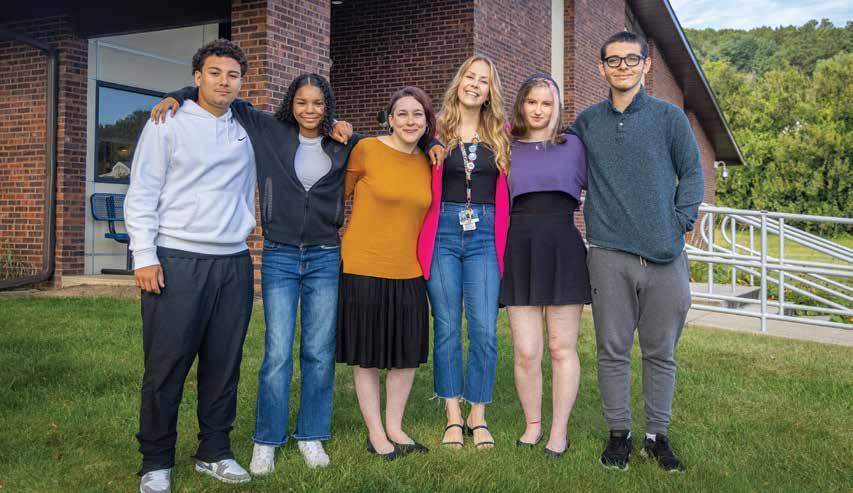
Showing Up, Cashing In: How Small Incentives Spark Big Attendance Gains
School administrators all over Berks County – across the country, really – struggle to improve their students’ attendance rates. Despite their best efforts to keep students in the classroom, the truancy issue continues to cause disruptions in classroom learning. The BISA (Berks Initiative for School Attendance) Attendance Improvement Fund of Berks County Community Foundation was established in 2023 and provides grant funding to support initiatives that improve attendance at Berks County’s public schools. Dr. Betsy Adams, BISA coordinator, feels strongly about this topic. Dr. Adams noted, “The impact of chronic absenteeism can be devastating
to individual students and schools. The BISA Attendance Improvement Fund provides a small incentive that can make a huge difference in a student’s life.”
Eighteen BISA grants were awarded across Berks County to eight different school districts during the 2024-2025 school year. One grant supported programming at Weiser Decisions in the Conrad Weiser School District. Weiser Decisions is an emotional and behavioral support program for secondary-age students. The students are given individualized academic instruction and are taught in a highly structured environment. The goal of the program is to help students develop
the skills necessary to be successful in a public school setting.
Mrs. Taylor Boland, school social worker, wrote the grant for their “Show Up, Cash Out” incentive program. She explained, “Students will have the ability to earn gift cards for improving their attendance. We will identify students who struggle with truancy at their attendance conferences.”
During the 2024-2025 school year, seven students were experiencing chronic truancy or were on a path to chronic truancy. Those students were offered incentives for good attendance. Students could choose from gift cards
Weiser Decisions students with Kim Sheffer, Lifelong Learning Program Officer (orange sweater), and Taylor Boland, school social worker (pink blazer)
or payment for an item or service, like sports membership. Weiser Decisions is a small program with a population of 35 students; this group of students represented 20% of the program’s student body.
The incentive’s results were positive. Four of the seven students increased their attendance by going from one to three days per week to consistently attending school five days a week for the majority of the year. Those students earned $10 in gift cards that they either took home with them at the end of the week, or kept track and cashed out the gift cards for a larger item. Mrs. Boland shared, “I found that this method created a level of buy-in from the students, and they had fun checking with me each week to see what they had earned for improving their attendance.”
• Student 1 improved from 47% to 83% attendance.
• Student 2 improved from 30% to 70% attendance.
• Student 3 had not previously struggled with truancy, however after the December break, he did not return for seven weeks. Mrs. Boland discussed this program (in addition to mental health supports), and the student had eight straight weeks of perfect attendance.
• Student 4 has a history of struggling with attendance and experienced a traumatic event outside of school, making it harder to return. In their second semester, Student 4 had eleven consecutive absences. Mrs. Boland suggested this program, and the student decreased their absences by 4.5% - a small but significant decrease, considering their circumstances outside of school.
Three of the participating students continued to struggle with truancy,
but Mrs. Boland was able to identify mental health support systems to assist those students. Student 1 proudly showed off the sneakers that he saved his weekly earnings to buy. Mrs. Boland shared, “The other students were so encouraging and supportive of him and his progress, it was such a heartwarming thing to witness. It created a really positive and encouraging experience for everyone.”
Small changes can make a big difference in the lives of students. The BISA Attendance Improvement Fund applications are open to school administrators from August 15th to January 15th. For more information on the BISA fund, please scan the QR code or email Kim Sheffer, Lifelong Learning Program Officer, at kims@bccf.org.

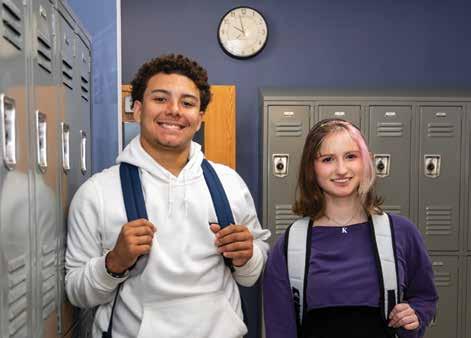
Shovel-Ready Restoration: Berks Nature Volunteers are Breaking Ground on Healthy Environmental Projects
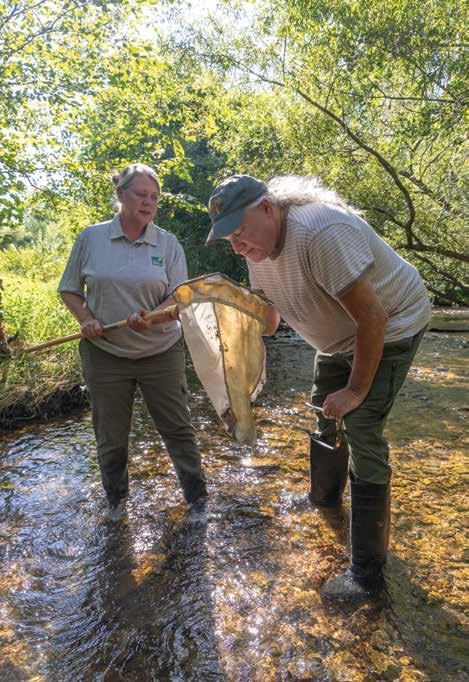
This year, Berks Nature’s four active watershed associations will identify and prioritize restoration projects in each of their respective watersheds. The projects, led by dedicated volunteers, will have far-reaching environmental benefits for the county and beyond. So, who are these volunteers, and why is their work important?
Watersheds and the association volunteers who care for them play an important role in the health of our rivers and streams. A watershed is an area of land that water flows across, or under, on its way to a stream, river, or lake. There are dozens of watersheds in Berks County, and Berks Nature’s loyal cohort of volunteers manages four active watershed associations, representing nearly 50% of the watershed geography in Berks County. The four watersheds cared for by Berks Nature volunteers are as follows:
1. Angelica Creek Watershed Association
2. Hay Creek Watershed Association
3. Maiden Creek Watershed Association
4. Tulpehocken Creek Watershed Association
The volunteers in these associations understand the importance of environmental health and the small changes that can be made to improve the lives of our planet and ourselves. Thanks to the Innovation Fund of Berks
Watershed association volunteers Bethany Ayers Fisher (left) and Stanley Kemp (right) observe the specimens collected in their net.
County Community Foundation, the association’s volunteers will do the following:
1. Connect with the landowners within each watershed
2. Identify the conditions of the area’s environment and infrastructure
3. Target high-priority properties that contribute to the degradation of our waterways
4. Consult with local Environmental Advisory Councils
Berks Nature will break ground on these shovel-ready projects once they have been identified. The volunteers will also engage public spaces in educational programming about water quality and environmental health.
Water is an invaluable and finite resource that we cannot afford to take for granted—and so is the health of our environment. By implementing environmental infrastructure in our communities, the Watershed Association volunteers of Berks Nature are moving the needle toward creating a healthier and more sustainable Berks County.
The Innovation Fund provides grants to projects focused on improving environmental health and climate resiliency in Berks County. Visit The Innovation Fund - Berks County Community Foundation to learn more.


“Investing in grassroots restoration is one way we can protect our environment for future generations.”
–Emily Smedley Environment and Energy Program Officer
Top: Berks Nature Volunteer Engagement Coordinator & Educator, Beckey Seel, checks water quality conditions in Angelica Creek.
A watershed association volunteer inspects a rock from Angelica Creek for critters and other organisms.
Improving Diabetic Outcomes
Diabetes is one of the top health issues presented by patients at Berks Community Health Center (BCHC); 3,096 of their patients were diagnosed with diabetes in 2024 alone. Learning to care for oneself or a loved one newly diagnosed with Type 2 diabetes can be a great challenge.
BCHC received two grants from the Home Health Care Foundation Fund of Berks County Community Foundation to initiate a diabetes education program and a diabetes self-monitoring program.
The new diabetes education program began in April 2025 and provides attendees with a nurse practitioner and community health worker who will educate and motivate patients with diabetes to take charge of their health and their lives. This program is adapted from a self-care program for diabetics from the Association of Diabetes Care and Education Specialists. BCHC’s new education program successfully completed two cohorts. The first cohort followed a monthly schedule, which presented attendance challenges.
The second cohort adopted a weekly format and saw significantly improved engagement.
BCHC’s new diabetes program will perform pre- and post-assessments to assess their diabetic health literacy. In addition, A1C levels will be taken before and after the program to also measure success. BCHC’s goal is to enhance understanding, prevention and management of diabetes, ultimately improving the lives of those at risk and affected by the disease. The grant from
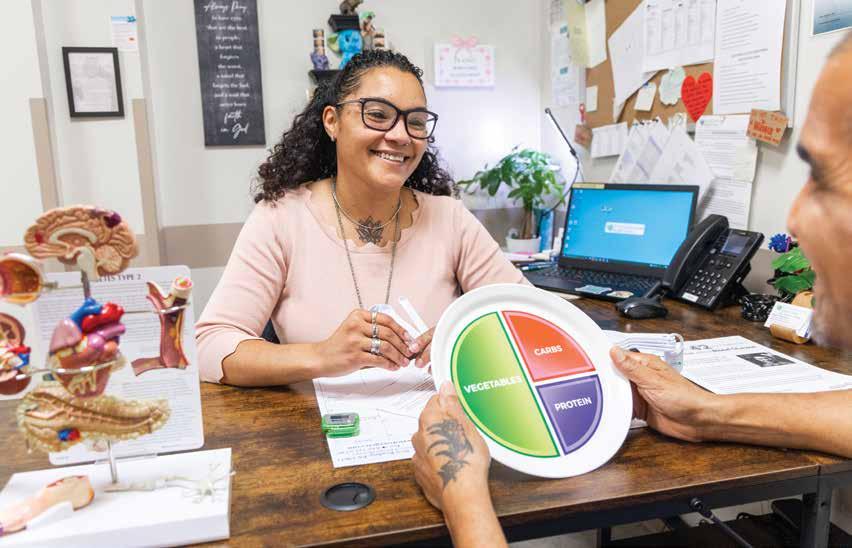
Community Health Worker, Karen Villavicencio, educates her patient on healthy food choices.
the Home Health Care Foundation Fund was also used to purchase diabetic monitoring tools, such as glucometers and test strips, for patients who are uninsured or whose insurance does not cover these necessary supplies.
Health literacy is important for individuals with diabetes because managing diabetes is complex. Diabetic patients need the necessary skills and abilities to gain, understand, analyze, communicate, and enumerate diabetes-related information both in healthcare settings and in their daily lives. Combining education with tools and monitoring of sugar levels, patients will have what they need to be able to successfully control their diabetes.
The second grant supported the selfmonitoring program, modeled after BCHC’s successful blood pressure selfmonitoring program. BCHC providers will refer newly diagnosed Type 2 diabetic patients and uncontrolled Type 2 diabetic patients to BCHC’s quality department’s self-monitoring diabetes program. BCHC worked to secure access to Abbott Pharmaceuticals’ Compassionate Care program, which offers discounted Libre 3 monitors to approved healthcare providers. BCHC was successful in enrolling in this program and can now purchase devices at a discounted price.
Patients receive a glucose monitor to test sugar levels daily. BCHC staff members assist patients with downloading an app on their smart device so the patient can have the readings in a digital view, and the nurse can closely monitor the patient’s
“When I started this class for understanding diabetes with Jessica and Karen, my sugar was uncontrolled. I’m doing very well controlling my sugar and I am proud because I learned from them how to take care of myself. This class is awesome.”
–Program participant
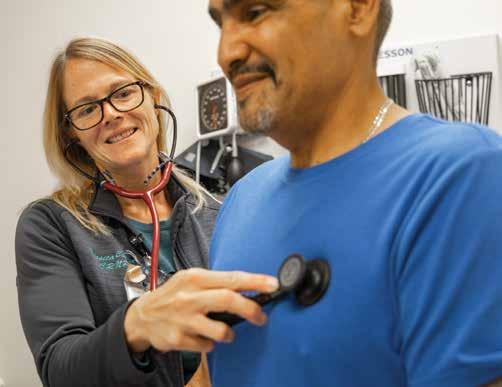
sugar levels. This provides the nurse with continual feedback to determine if medication or dietary changes are necessary. The nurse and patient will be in constant communication throughout the process until the patient can independently manage their diabetes.
The innovative ideas and personalized care provided by these programs will
improve outcomes for diabetic patients in Berks County. Funding from the Home Health Care Foundation Fund made these programs possible. For more information, scan the QR code or email Cindy Milian, Health & Human Services Program Officer, at cindym@bccf.org.
BCHC CRNP Jessica Conner works with a patient in the diabetes program.
A Straight Line – One Community Member’s Path to Helping Students Succeed

Sometimes a person’s life path takes a lot of twists and turns before it becomes clear what he or she is meant to do. Other times, every step along the way is clear. Myrna Fuch’s life path is a straight line to her life’s work.
Myrna Fuchs didn’t grow up in Berks County, but she’s called it home for over fifty years. Her life began on Long Island, New York, where she lived with her parents and older brother. While Myrna was in her early high school years, she attended a summer camp in Massachusetts which opened her eyes to the world outside her hometown. During that time, she heard stories of campers who attended a boarding school nearby called Windsor Mountain School. By then, Myrna’s older brother moved away, serving in the military. With the family business an hour away and Myrna often coming home from school to an empty house, her parents warmed to Myrna’s pleas to attend boarding school.
Myrna met students from different cities, different countries, and different socio-economic backgrounds at school. There were wealthy students and scholarship students - students from Detroit, Africa, and Austria to name a few. The headmistress came from Austria and brought a group of students with her to establish Windsor Mountain School. The school was full of kids with interests in the arts and in politics – and
Myrna Fuchs
it felt much different than where she had been raised. Myrna recalled, “That school changed my life, my perspective. I was brought up as a ‘normal’ middle, upper middle-class child with two working parents. Meeting a more diverse group of people opened my eyes to different things, and it did the same for my parents.”
The headmistress introduced different ways of learning to the students, including small group discussions about topics Myrna had never considered before. “I remember that we’d sit and decide as a group what to discuss that day. We were even discussing Nietzsche; I remember things like that.”
After high school, Myrna’s parents preferred for her to be closer to home, so she attended Adelphi University on Long Island as a commuter student. It was during that time that she met Peter Fuchs. She then began studying for her master’s degree in public policy and social sciences at New York University (NYU). Myrna and Peter got married when she was twenty-one and moved to Reading, Pennsylvania, after Peter received an offer to work as an industrial engineer for Carpenter Technology. Myrna continued her master’s studies while living in Reading through a University of Northern Colorado program.
Career Path
In her early career days, Myrna served as a planner and deputy director for the Reading Model Cities Program, an urban planning program. In that role, she started learning about community organizing:
gathering people for conferences, inviting speakers, and getting people together to share resources.
Next, Myrna was recruited to work for the PA Department of Community Affairs, providing housing rehabilitation services statewide. Once Myrna and Peter’s daughter, Erica, was born, Myrna took time off from work to be home with her child; their son Geoffrey arrived a few years later. Myrna eventually went
“Meeting a more diverse group of people opened my eyes to different things, and it did the same for my parents.”
–Myrna Fuchs
back to work part-time within the same Community Affairs department.
Once both kids were in school, Myrna made a change and worked for the federal talent search program at Reading Area Community College (RACC). This is where her passion for helping students started to take shape. When asked about her talent search role, Myrna said, “I worked in some different middle schools, doing college counseling specifically to get the kids to think about college. I’d set up workshops and go to different school districts. And I fell in love with it.”
During her time at RACC, Myrna and Tom McMahon, former mayor of Reading, established a mentoring program – they brought middle school students and career professionals together, typically at a restaurant for pizza, to establish a student-mentor relationship.
Myrna’s role at RACC eventually became full-time. She worked directly with students at Reading High School as a college counselor. Myrna was the kind of college counselor who would make appointments with students and find them in their study hall if they didn’t show up on time.
Now, she still remembers one student who responded to her “pushiness” by telling Myrna, “I know you’re trying to help me, and you want me to go to college, but I’m undocumented and my family can’t afford it. I don’t even know if I could be accepted into college.” This conversation helped Myrna realize how much help her student mentees needed.
Determined to meet the needs of all her students, Myrna and Tom McMahon approached the volunteer members of Greater Reading Immigration Project, a group formed to help immigrants in the area, and asked if they would help start a scholarship fund for undocumented students. The group raised funds and established the GRIP Dreamer Scholarship Fund at Berks County Community Foundation in 2013. The fund awards scholarships to students who are not eligible for Federal and/ or Pennsylvania financial aid or are otherwise ineligible for financial aid. The fund has awarded over $200,000 in
scholarships to nearly seventy students since it was established. Over the years, Myrna and Tom McMahon have become more involved with GRIP, holding fundraisers, summits, and workshops.
Franki Aitken, CFO and COO for Berks County Community Foundation, helped get the GRIP Dreamer Scholarship Fund up and running and has worked closely with Myrna over the years to administer the scholarship. Franki notes, “Because of Myrna, there are so many students in Berks County who have gone to college who otherwise would not have had the opportunity.”
When asked about the best part of her work, being involved with GRIP, and establishing the scholarship fund, Myrna simply said, “The best part is my passion to help kids.” And help kids she did. Maria Reyes, one of her mentees, recalls, “She played a vital role in my education, and I am forever grateful to have come across someone like her in my life.”
Over the years, Myrna has held various counseling positions in Reading – from Olivet Boys and Girls Club to RACC and Reading High – and continues to make a difference in the lives of hundreds of students and their families. Now, she works all year long to provide individual holistic counseling and guidance on the college process to help students find their ‘best college fit’ academically, socially, and financially.
One of Myrna’s mentees from Reading High School, Paula Martinez, shared
that, “Thanks to Myrna’s guidance and support, I was able to navigate the college search and application process as a first-generation immigrant student over twenty years ago. Her mentorship sparked my interest in higher education and made what once felt impossible, achievable. Throughout her career, Myrna has empowered hundreds of firstgeneration, low-income students like me to pursue their educational goals. Her
“Throughout her career, Myrna has empowered hundreds of first-generation, low-income students like me to pursue their educational goals.”
–Paula Martinez
commitment extends even further—she has tirelessly advocated for students ineligible for financial aid due to their immigration status. Myrna’s dedication, empathy, and unwavering support for diversity are truly commendable and deserving of recognition.” Paula is now a senior audit supervisor at Santander Bank.
At seventy-eight years old, Myrna plans to continue working as long as she’s able.
Her son, Geoffrey, passed away at the age of twenty-two, and her beloved husband, Peter, died in 2019. When she has time outside of her work with students, she spends time with her daughter, Erica, who lives in Pittsburgh with her husband and two children.
Myrna’s passion for helping others is the result of her upbringing and experiences as a professional in Reading. She may not have been born here, but her contributions are making an impact for generations of students to come.
If you are like Myrna and would like to establish a fund to support the causes that interest you, please reach out. Our team is here to help. Scan the QR code or email Molly McCullough Robbins, VP for Philanthropic Services, at mollyr@bccf.org.

Barrier-Free and Sensory-Friendly: How Colebrookdale Railroad Continues to Innovate
Each year, Colebrookdale Railroad welcomes over 30,000 tourists for first-class train car excursions through Secret Valley, a historic region in Pennsylvania that stretches from Boyertown to Pottstown. Colebrookdale Railroad is the perfect place for visitors of any age to climb aboard and experience luxury accommodation and live entertainment. But what about the train enthusiasts who can’t physically get into the cars – or the locomotive lovers who are overstimulated by loud noises and large crowds?
The railroad’s new project, “ALL Aboard! The World’s First Barrier-Free Classroom-on-Rails” attempts to bridge the education and experiential fun gap for individuals in Boyertown who are elderly, disabled, and/or autistic. By completing the world’s first sensoryfriendly and wheelchair-accessible train car, Colebrookdale Railroad is chugging steadily toward the future they envision for the region.
The ADA-compliant train car, which will be available for visitors by the end of
October, will be accessible for people who use mobility devices to maneuver around. “This means we will no longer leave persons in wheelchairs behind as the train pulls away. We can instead welcome residents who would find joy aboard our trains and at present, cannot get on board,” stated Nathaniel Guest, Executive Director of Colebrookdale Railroad.
But Nathaniel’s expansion into accessible train cars does not end there. In a 2022 study conducted by
Colebrookdale Railroad cars
the railroad, a small but significant portion of their target tourism market did not visit the railroad; parties with an individual on the sensory spectrum stayed at home. The study suggested that the absence of quiet spaces placed a hefty barrier of entry for many individuals on the autism and sensory spectrum.
The benefits of an ADA-compliant train car are plentiful. Nathaniel projects an additional 10,000 visitors will be welcomed to the railroad and the downtown Boyertown area. According to the RIIMS II economic modelling service, this equates to more than $285,000 in annual economic impact, ten construction jobs, two permanent jobs, and multiple vocational/technical training opportunities for Boyertown
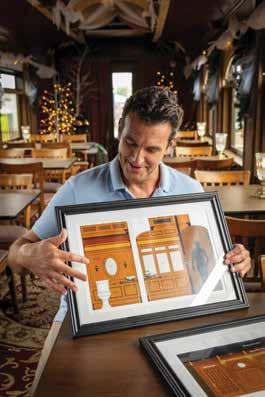
and Montgomery County’s special needs/at-risk workforce.
Once the train car is operational and ready for visitors, tourists can expect the following ADA-compliant features:
• Sounds/vibration-deadening wall panels
• Partition walls for privacy
• Accessible bathroom and toilet for wheelchair-bound individuals
• Upgrade of ventilation filtration system for compromised immune systems
• Upgraded suspension springs for a softer, smoother ride
“The installation of an ADA-compliant car at Colebrookdale Railroad will improve the quality of life for Boyertown residents by stimulating local economy

and opening doors for people who were once excluded,” says Emily Smedley, Environment and Energy Program Officer for Berks County Community Foundation. “When accommodations are made for disabled people, everyone benefits.”
“ALL Aboard! The World’s First Barrier-Free Classroom-on-Rails” was made possible in part by the Marlene L. Driscoll Fund of Berks County Community Foundation. The fund was established to support programs that benefit residents of the Boyertown Area School District.
To learn more about the Marlene L. Driscoll Fund of Berks County Community Foundation, please scan the QR code.
Left: Josh Alderfer, General Manager, points to renderings of ADA-compliant features being implemented in a Colebrookdale Railroad car. Right: The welcome center at the railroad station.
TCA Don’t Quit Foundation Reimagines a Waste-Free City through Community Art Initiative
Theron Cook Art (TCA) Don’t Quit Foundation doesn’t simply upcycle trash bins: they’re curating a community art project that promotes environmental stewardship and encourages creative expression.
“ArtCycle: Transforming Trash Into Treasure” is their creative reuse project that aims to beautify Reading parks and spark personal growth, one painted trash bin at a time.
Reading is a city known for its public art. With more than seventy-five public art installations in the Greater Reading area alone, muralist Theron Cook feels right at home—and ready to add more installations to the list. His latest artistic endeavor is not his own creation, however, but a community art project that encourages civic engagement and educates local youth on the importance of recycling.
The project begins with guided art sessions led by TCA Don’t Quit Foundation. The foundation encourages kids to paint trash bins with uplifting designs and positive messages.
“ArtCycle” is about more than establishing the mind-body connection: its main goal is to communicate the impacts of recycling on the community and, by extension, the world. By transforming one trash bin, kids witness how their actions influence the culture and vitality of their neighborhood—they take ownership of their public spaces and become stewards of a cleaner, waste-free Reading.
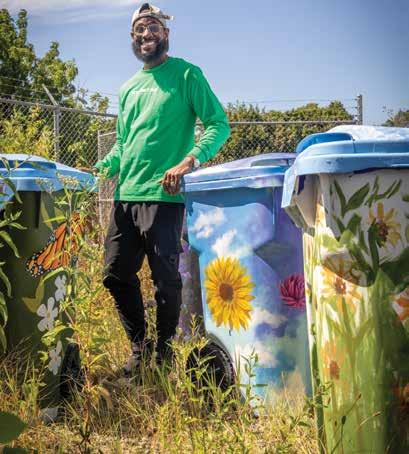
TCA Don’t Quit looks forward to continuing their upcycling program by encouraging local schools and community centers to participate in the bin beautification project throughout the year.
“ArtCycle” was made possible, in part, by the Berks County Arts Fund of Berks County Community Foundation. Are you interested in supporting community-focused arts projects? Scan the QR code to learn more and donate today!
“ That’s what this project is about: art is everything, and it’s more resourceful and healing than we think.”
–Theron Cook
Theron Cook
Connecting the Dots in Berks County
The program team of Berks County Community Foundation, comprised of experts in their fields of interest, visits local institutions to discuss their community programming. At these site visits, the foundation’s program team meets with the leaders of these various institutions to get a better idea of the challenges they face and opportunities for growth.
While some of the organizations, nonprofits, and initiatives have received grants from the funds the foundation manages, others simply enrich the cultural, educational, environmental, medical or religious life of the region.
Meeting our community friends, volunteers, and partners strengthens our connections and expands our knowledge of Berks County. When we can identify resources, funding opportunities, and experts in the fields we serve, we create a stronger county. Improving the lives of our residents cannot be accomplished solely through grantmaking and scholarships: connecting the dots from our community members to our civic leaders is essential for real, impactful change.
OUR PROGRAM TEAM
MONICA REYES
Vice President for Programs & Initiatives
Monica leads the program team and has supervisory responsibility for a broad range of important functions within the Community Foundation. Monica develops and tracks the strategy for a wide range of initiatives and oversees the grant distribution process for a portfolio of charitable funds.
CINDY MILIAN
Health & Human Services Program Officer
Cindy Milian oversees grants for individuals, public health initiatives, and human services initiatives.
KIM SHEFFER
Lifelong Learning Program Officer
Kim manages education-related grantmaking and initiative work, as well as 130 different scholarship opportunities.
EMILY SMEDLEY
Environment & Energy Program Officer
Emily manages grantmaking and initiatives that focus on preserving open space, promoting energy efficiency, and reducing negative impacts to the environment in Berks County.
DANIEL GOMBAR
Grants Management Administrator
Dan helps with online grant and scholarship application troubleshooting and questions about the grant or scholarship process, including follow-up reports.
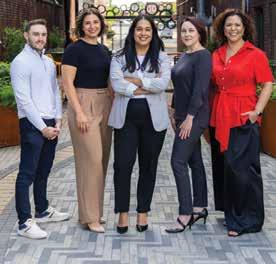
Program Team:
Our
Daniel Gombar, Emily Smedley, Monica Reyes, Kim Sheffer, Cindy Milian
Mini Grant, Major Impact: Young Learners Explore Climate Through Hands-on Weather Tools
Teachers all over the country work within their limited budgets to provide their students with engaging and creative learning experiences. The Teacher Mini-Grants Fund of Berks County Community Foundation offers an opportunity to implement projects and lessons that might otherwise be impossible due to budget constraints. Each year, teachers may apply for up to $500 each in funding for a classroom activity or project that will improve student learning and enhance the existing curriculum. Creative projects
are preferred. One such creative project that was approved for the 2024-2025 school year is a weather station at the West Reading Elementary Center in the Wyomissing Area School District.
Sixth grade science teacher, Andrea Kupiszewski, requested a mini-grant to purchase an outdoor weather station. The station will connect to the Weather Underground network so that the West Reading Elementary Center is a source for Weather Underground’s network of data.
Ms. Kupiszewski procured smaller scale weather tools for students to utilize during lessons to see where weather data such as wind direction, wind speed, barometric pressure, and temperature originate. During instruction, students will use the individual tools to gather data and compare that data to the ambient weather station and other data from the Weather Underground Network. This equipment will be used on an ongoing basis to teach and understand weather and climate for many years.
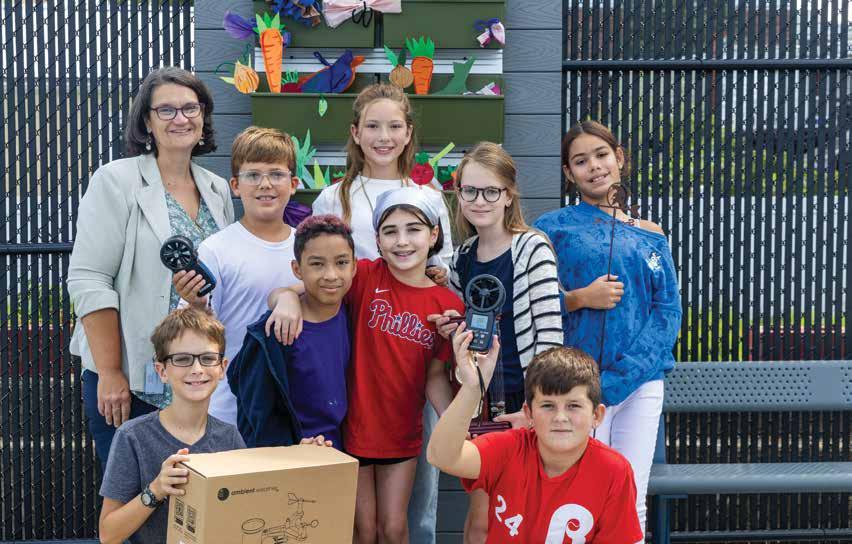
Ms. Andrea Kupiszewski and her students on the playground at West Reading Elementary Center, where the new weather station has been installed.
Fifth and sixth grade students will have the opportunity to engage with this new equipment, and Andrea Kupiszewski is excited to show the students how a weather station that feeds into a larger network will introduce concepts about making predictions and seeing patterns over time.
In FY2025, nine school districts benefited from teacher minigrants totaling $9,946.
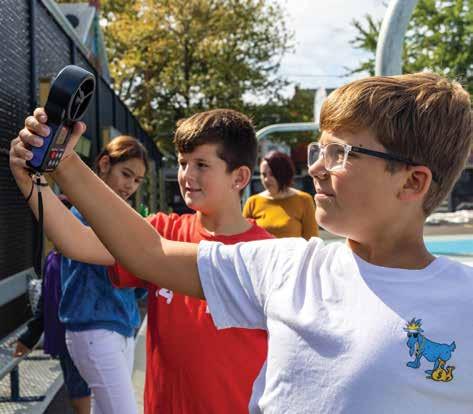
For more information about the Teacher Mini-Grants Fund, including how to make a donation or apply, please visit:.
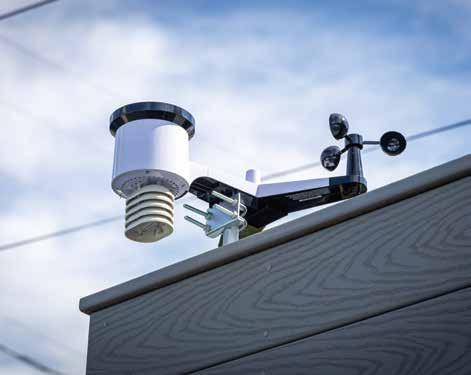
West Reading Elementary Center students utilize weather tools that complement the new weather station, below.
Board, Committees, and Staff
Board
Officers*
Susan N. Denaro, Esq. Board Chair Attorney, Plank ◆ Frankowski Attorneys at Law
Kevin K. Murphy President Berks County Community Foundation
Frances A. Aitken, CPA** Treasurer Berks County Community Foundation Chief Operating Officer, Chief Financial Officer
Jay R. Wagner, Esq.** Secretary Shareholder, Stevens & Lee
Directors*
D. Michael Baxter, MD Former Chair of the Department of Family and Community Medicine
Lyn Camella-Smith Retired, Resident Director and Vice President, Merrill Lynch Term ended June 30, 2025.
Susan N. Denaro, Esq. Attorney, Plank ◆ Frankowski Attorneys at Law
Vicki Ebner, Esq. Retired, Senior Counsel, East Penn Manufacturing
Directors*
Dr. Thomas Flynn President Emeritus of Alvernia University
Steven Fritz Retired President, VF Outlet
Hon. Carissa Johnson, MBA Magisterial District Judge, District Court 23-1-02
Julia H. Klein
Independent Board Director/ Advisor/Investor
Rabbi Brian Michelson Reform Congregation Oheb Sholom
Kevin K. Murphy President, Berks County Community Foundation
Gabriela Raful, Esq. Senior Partner, Galfand Berger, LLP
Michael J. Rowley, ABV, CVA, CPA, CFF Partner, Chairman of Board Herbein + Company, Inc.
Tricia J. Salvatore Ludgate, CFP Certified Financial Planner, Sovereign Financial Group, Inc.
Douglas F. Smith Vice President/Commercial Loan Officer, Mid Penn Bank
Richard L. Stoudt, Jr. Retired President, High Construction Company
Committees † Staff
Executive Committee
Lyn Camella-Rich
Susan N. Denaro, Esq., Chair
Kevin K. Murphy
Gabriela Raful, Esq.
Michael J. Rowley, CPA/ABV, CVA, CFF
Jay R. Wagner, Esq.
Governance Committee
Susan N. Denaro, Esq.
Thomas Flynn
Hon. Carissa Johnson, MBA
Julia H. Klein
Kevin K. Murphy
Gabriela Raful, Esq., Chair Ramona D. Turpin
Audit Committee
Susan N. Denaro, Esq.
Vicki Ebner, Esq.
Stephen M. Fritz
Michael J. Rowley, CPA/ABV, CVA, CFF, Chair
Douglas F. Smith
Carl Sottosanti
Rick Stoudt
J. William Widing III, Esq.
Finance Committee
Susan N. Denaro, Esq.
Vicki Ebner, Esq.
Stephen M. Fritz
Kevin K. Murphy
Michael J. Rowley, CPA/ABV, CVA, CFF, Chair
Douglas F. Smith
Carl Sottosanti
Rick Stoudt
J. William Widing III, Esq.
Investment Committee
Lyn Camella-Rich, Chair
Susan N. Denaro, Esq.
Stephen M. Fritz
Kevin K. Murphy
P. Sue Perrotty
Douglas F. Smith
* Officers and Directors as of July 1, 2025.
** Serves as an officer, not a board member.
† Committees as of July 1, 2025.
Frances A. Aitken, CPA Chief Operating Officer, Chief Financial Officer
Adriana Alarcon Receptionist
Vivi Anthony Executive Assistant
Sally Cox Finance and Operations Administrator
Dan Gombar
Grants Management Administrator
Julie Hartman
Senior Accountant
Jen Heydt Communication Manager
Cindy Milian Health and Human Services Program Officer
Karen A. Miller Senior Fellow
Kevin K. Murphy President
Dave Myers Senior Fellow
Monica Reyes Vice President for Programs and Initiatives
Molly McCullough Robbins Vice President for Philanthropic Services
William R. Sheeler Senior Fellow
Kim Sheffer Lifelong Learning Program Officer
Emily A. Smedley Environment and Energy Program Officer
Carl Sottosanti
Rick Stoudt
J. William Widing III, Esq.
Staff as of September 15, 2025
About Berks County Community Foundation
Berks County Community Foundation is a nonprofit corporation that serves as a civic leader for our region by developing, managing, and distributing charitable funds aimed at improving the quality of life in Berks County, Pennsylvania.
The official registration and financial information of Berks County Community Foundation may be obtained from the Pennsylvania Department of State by calling toll-free, within Pennsylvania, 1.800.732.0999. Registration does not imply endorsement.
610-685-2223 www.bccf.org
